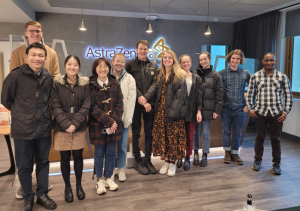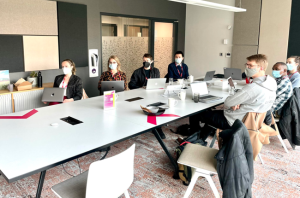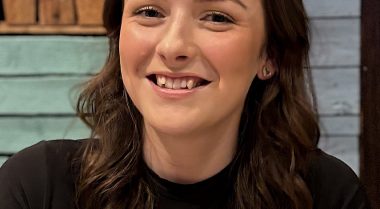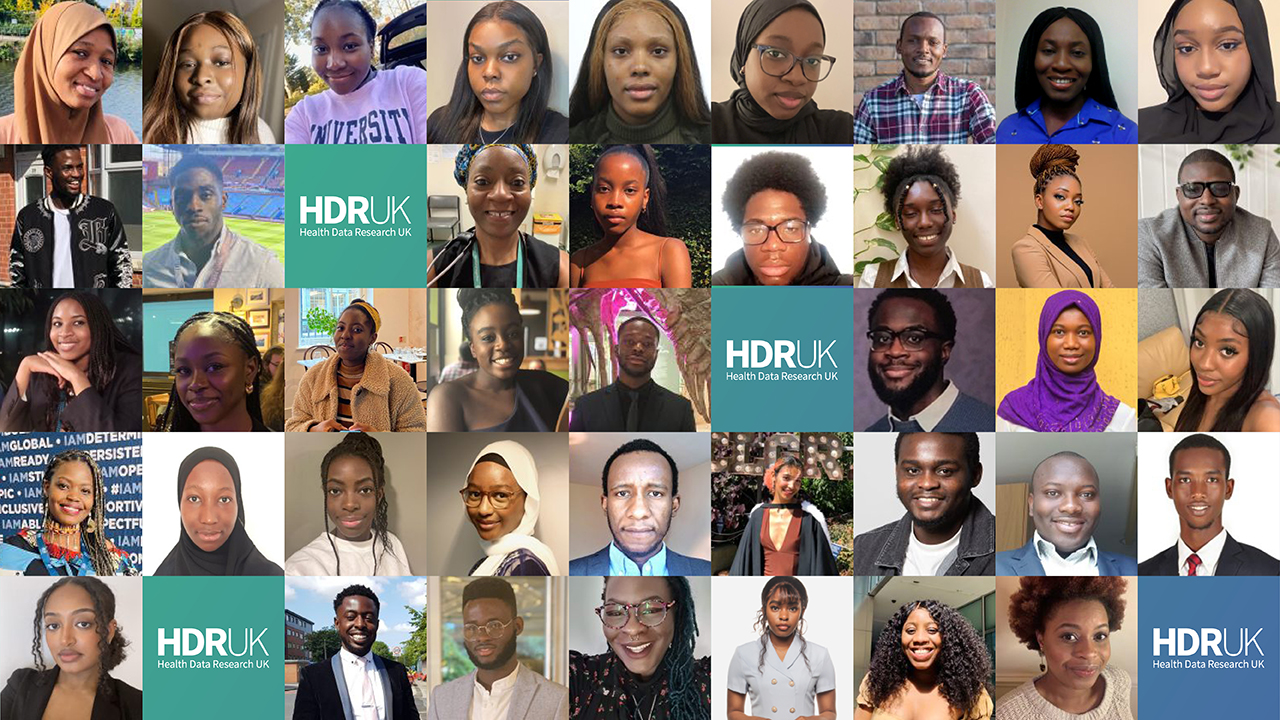AstraZeneca PhD Immersion Week
16 March 2022
Immersion weeks form a key component of the HDRUK-Turing Wellcome PhD programme. Below, Programme Director Chris Yau and participant Richard Moulange write about the most recent, which was hosted by AstraZeneca.
Professor Christopher Yau, PhD Programme Director
Our three to five-day residential immersion events introduce PhD students to an area of importance for health data science and act as a key part of our national cohort building activity. Previous ones have included courses on epidemiology and clinical risk prediction models led by universities within our partnership network. However, it has always been our intention that some immersions would be hosted and led by industry. It was therefore with much relief, following two years of pandemic disruption, that we were finally able to hold our first industry-led immersion week with AstraZeneca in March.

HDRUK PhD students were welcomed for three days of learning at AstraZeneca’s Cambridge headquarters. Each session, delivered by AZ scientists, gave our students direct insight into their day-to-day research and development work. Topics covered included knowledge graphs, toxicology, image analysis and the all-important subject of clinical trials which of course underpins much of the core business of any pharmaceutical organisation. This was a unique learning opportunity going far beyond what would be learnt from a typical recruitment event or conference workshop.
In the feedback afterwards Claire Coffey, of our 2020 cohort, said: “We really appreciated the opportunity to get an insight into the data science work AstraZeneca is doing, as well as the chance to chat to lots of people in the company in a more informal way, to gain some insider information about what it is like to work at AstraZeneca. Everyone seemed genuinely happy to talk to us. It was also surprising how many of the people speaking with us were quite high-up, for example, data science team leaders – this also made us feel valued that these ‘important’ people were willing to take the time for us. We hope that we will be able to keep in touch with some of these people, and that we may have more opportunities similar to this in the future.”
A roundtable discussion was a particular highlight with HDR UK PhD students preparing a long list of questions for the AZ team. I was pleased to learn that questions concerned issues ranging from the potential fallacies of using p-values in statistical analyses to the ethics and diversity concerns of ensuring adequate population representation in clinical trials. The latter is a key aspect of modern health data research that HDR UK strongly advocates for and I was proud that our students were not afraid to ask challenging questions and pleased that AZ were open in their responses leading to a positive interaction.
For the first time, we also invited a non-HDR UK PhD student (see Richard’s blog below) to join proceedings something that we would like to build upon in the future. Ultimately, we want immersion weeks to be accessible to all HDR UK PhD students so that we can bring equitable access to the very best health data science training to doctoral students wherever they are based in the UK. My team will be working on this in the future.
Overall, this was a unique opportunity to have a large reputable multi-national organisation opens its doors in this way to our students. We hope this will be the first of many similar partnerships for the HDRUK PhD programme going forward.
We are extremely grateful to all our AstraZeneca hosts and in particular Drs Vera Hazelwood and Marta Milo for initial organisation and support throughout.
Many thanks to Claire Coffey and other HDRUK PhD students who helped to document the event.
Richard Moulange
I was recently very kindly invited to take part in an HDR UK Immersion Week in Cambridge, led by research scientists at AstraZeneca. Together with first- and second-year students on the HDRUK–Turing PhD Programme, I enjoyed three days of talks, workshops and discussion groups with leading data scientists and biologists at the British-Swedish pharmaceutical company.

I am currently a first-year PhD student at the MRC Biostatistics Unit at the University of Cambridge, supervised by Sach Mukherjee and Oscar Rueda. We work on applications of machine learning (ML) to cancer genomics and are particularly interested in transfer learning, causal inference and how to make ML systems robust to distribution shift.
Being the first external student to join an HDR UK Immersion Week was quite daunting in the beginning but it was great to meet other like-minded PhD students from all over the UK and learn about their research topics, which span the entire health data science landscape. I have previously participated in an Academy for PhD Training in Statistics (APTS) week, but APTS has an academic focus, so joining industry-based training was even more exciting! I think HDRUK’s emphasis on helping PhD students explore industry perspectives is really important.
The AstraZeneca presentations covered a wide range of interesting topics including using knowledge graphs for drug discovery, designing new types of clinical trials and estimating the prevalence of rare diseases. But the best parts of the Week were the Q&A sessions in between talks: the AstraZeneca staff encouraged us to ask lots of questions and were very generous with their time: discussions regularly carried on into lunch. While I learnt a lot about the differences between industrial and academic work, one of the key messages was how collaboration between academia and the pharmaceutical industry is only increasing, especially in data science and AI.
I’d like to thank both the HDR UK students and the AstraZeneca staff for being so welcoming, and especially Peter Diggle and Christopher Yau (former and current Directors of the HDRUK–Turing PhD Programme) for allowing me to take part. It was such a great experience and I would love to see more collaboration between the HDRUK–Turing PhD Programme and other doctoral students in the future, especially through partnerships with industry.



